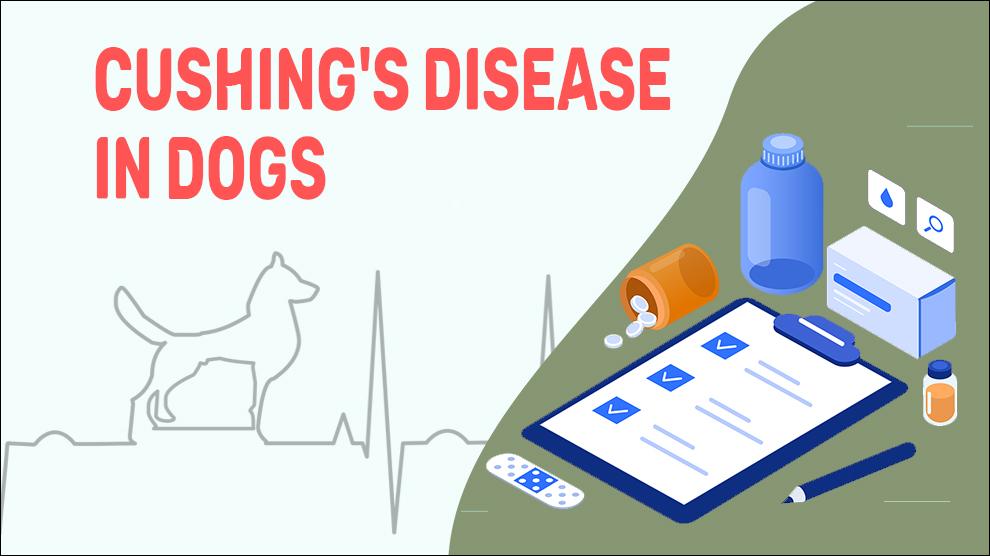Cushing's disease (hyperadrenocorticism) is an autoimmune disorder caused by increased production from the outer part or cortex of the adrenal gland resulting in overproduction of cortisol (cortisone). The literal meaning is, “hyper” means unusually active, “adreno” represents the adrenal gland, and “corticism” indicates the cortex.
Excessive or decreased production of cortisol can be life-threatening. The tumor of the pituitary gland is the most common cause of Cushing's disease (90% of all cases). The tumor may be either malignant (cancerous) or benign (harmless). The pituitary gland tumor results in overproduction of a hormone (ACTH) which in turn stimulates increased production of cortisol in adrenal glands.
On the other hand, Cushing's disease may be the result of a malignant or benign tumor of the adrenal gland itself (carcinoma or adenoma, respectively). When there is excessive administration of an oral or injectable steroid, it may result in iatrogenic Cushing's disease.
Symptoms Of Cushing's Disease
- Excessive hunger and/or thirst
- Frequent urination
- Poor appetite/ Anorexia
- Diarrhea
- Recurring urinary tract infections
- Potbellied appearance (fat body, bony head and legs)
- Excessive panting
- Muscle weakness
- Weakness, hypotension, and microcardia
- Hypocholesterolemia
- Hyperkalemia or a low sodium/potassium ratio
- Peripheral vasoconstriction
Treatment Options For Cushing's Disease
- There is no outright cure for Cushing's disease in dogs; nevertheless, the condition can be managed with proper hormone replacement therapy.
- For Canines with pituitary tumors, chemotherapy and/or radiation therapy may be suggested.
- Radiation therapy is given in small amounts over 2 to 5 weeks. Surgery may also be suggested.
- For Adrenal-dependent Cushing’s, Surgical removal of the tumor provides the best chance for relief of clinical signs and the best survival times.
- Chemotherapeutic agents, such as streptozocin - nitrosourea alkylating agent.
- Every 2 to 3 weeks -500 mg/m2
- Dogs may need Long term, treatment through drug therapy to replace the hormones-
- Mineralocorticoid replacement: fludrocortisone acetate (Bristol-Myers Squibb Company- Florinef) or desoxycorticosterone pivalate (DOCP). The cheaper option is DOCP (Novartis, Percorten-V).
- Glucocorticoidreplacement: Oral prednisone or prednisolone.
Home Remedies For Cushing's Disease
- Hyperadrenocorticism has a good prognosis with thorough monitoring by the owner and appropriate medication.
- Some pet owners may not be able to afford the medication expenses and may elect euthanasia as therapy is ongoing and dosage may need to be altered throughout the pet's lifetime.
- Hectic situations such as traveling, boarding, or emergencies may need some medications, such as cortisol, to be increased.
Prevention Of Cushing's Disease
- There is no means of preventing or avoiding Cushing's disease save genetic counseling.
- Never skip check-ups.
- Feed a home-prepared diet of pasture-fed, organically produced ingredients.
- When your dog is prescribed prednisone dosage, taper off slowly or else you might experience prednisone withdrawal symptoms resulting in Addison’s disease.
Affected Breeds Of Cushing's Disease
Poodle, Dachshund, Boston Terrier, Boxer, Beagle, Cocker Spaniel, German Shepherd, Great Dane, Labrador Retriever, Portuguese Water Dog, Nova Scotia Duck Tolling Retriever, Rottweiler, Standard Poodle, West Highland White Terrier
Additional Facts For Cushing's Disease
1. Causes:
- Pituitary damage or tumor
- Adrenal damage or tumor
- Excessive treatment with oral or injectable steroids
2. Types:
- Pituitary-dependent: Pituitary tumor or damage
- Adrenal-dependent: Adrenal tumor or damage
- Latrogenic: Excessive steroid treatment)
3. Mortality:
Untreated Cushing's syndrome can cause premature death due to uncontrolled diabetes mellitus, vascular disease (stroke/myocardial infarction), kidney-related complications, and infections.
4. Diagnosis:
- Complete blood count (CBC), blood chemistry profile
- Urinalysis
- ACTH stimulation test
- MRI and ultrasound
5. Prognosis:
Prognosis depends on the proper treatment of the underlying cause of the disease. Pituitary tumors respond well to radiation treatment when it is detected early. Usually, dogs with adrenal tumors may live 3-6 months without treatment, and the median survival time improves to 6-12 months with treatment.
Cushing’s disease goes ignored until it is a medical emergency. Symptoms can manifest suddenly and be extremely severe. This acute adrenal crisis includes critical symptoms such as shock and collapse.
When To See A Vet
- For a condition like Cushing's disease, don't skip regular vet visits, your dog's yearly veterinary check-up is not something to be missed.
- Once dogs are well regulated, evaluate them at least 2 times each year, with routine bloodwork and a physical examination.
Food Suggestions For Cushing's Disease
- Low fat, high protein foods - White-Fleshed Fish, Skinless, White-Meat Poultry, Beans, Peas and Lentils
- Lean protein sources
- Beef without fat
- Turkey breast
- Carrots, broccoli, green beans
- Apples and watermelon
- Pumpkin, sweet potatoes, bananas, blueberries
- DHA-mackerel, salmon, herring, sardines, and caviar
Conclusion
Canine hypoadrenocorticism presents with nondescript signs and is rarely pathognomonic. Although it is uncommon in dogs, pet owners should consider the diagnosis with the proper signalment and clinical signs. As with any disease, the prognosis is dependent on the extent of the disease, its location, and the treatment chosen. Identification and proper treatment can be highly successful, often long-term, and results in an excellent prognosis.

















